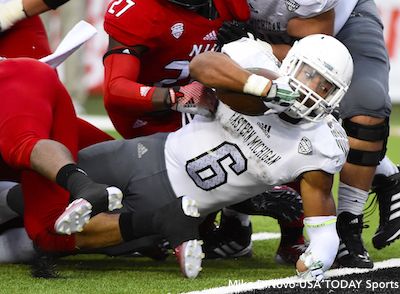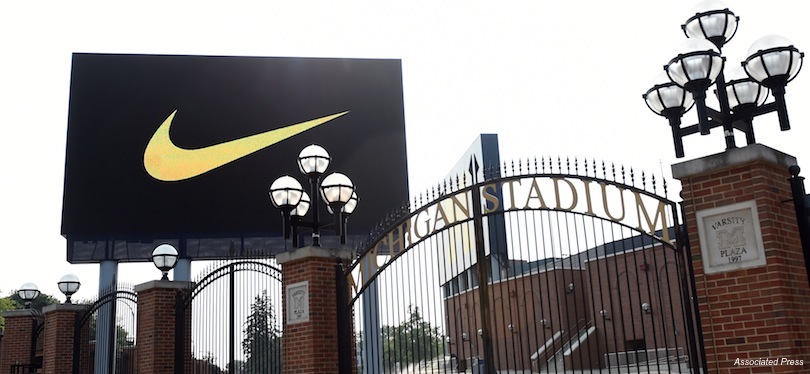The NCAA is under siege, and there's no way out of this mess.
On Thursday, the NCAA Board of Directors took the unusual step of reversing a satellite camp ban approved by the representatives of the 11 football conferences. The decision, however, was no surprise. It came after it was revealed that both UCLA's Dan Guerrero and Texas State's Larry Teis apparently voted against the wishes of the majority in their respective conferences, which would've caused the move to ban the camps to fail.
On top of that, the Department of Justice began looking into the camp ban last week. With mounting criticism from the public and media and the feds sniffing around, the NCAA simply decided it didn't need another headache.
But while the NCAA fended off one crisis for the time being, it has problems on multiple fronts. Let's count the ways, shall we?

Wealth Gap
The University of Idaho announced Thursday that it will move down from FBS to FCS, rejoining the Big Sky Conference in 2018. It becomes the first football program to move down from the highest division in more than two decades.
And it might not be the only one mulling that move. Both Eastern Michigan and Massachusetts, facing mounting athletic department deficits, are under pressure from their own faculty to consider taking similar steps.
Idaho's announcement came just days after the Big Ten is reported to be getting a massive new TV contract with Fox Sports that will pay the conference $250 million annually for half of its first-tier media rights. By the time the Big Ten is finished negotiating, each conference school is projected to receive more than $40 million per season through 2023. And oh, Michigan just inked its $173 million apparels deal with Nike, joining Ohio State, Texas and Notre Dame as schools receiving a new windfall this year.

All this makes the gap between college sports' haves and have-nots all the more yawning. While the name brand powerhouses work on athletic budgets north of $100 million per year, their non-power 5 brethren must make do with just a few million.
This economic model is not sustainable for half of the FBS schools. A permanent split may be coming sooner than you think.
Kangaroo Court Justice
This week the NCAA sent North Carolina an amended notice of allegations with regard to the university's decade-long academic fraud case. By all interpretations, the NCAA intends to go easy on UNC's money-making men's basketball and football programs while dropping the hammer on the women's basketball program.
This would fulfill the prophesy of the late Jerry Tarkanian, who spent nearly his entire career jousting with the compliance bureaucrats: "The NCAA is so mad at Kentucky it's gonna give Cleveland State another two years of probation."
But the NCAA's uneven hand in doling out punishment will be facing a real test in a real court very soon. Former USC assistant coach Todd McNair's defamation lawsuit against the NCAA is cleared to proceed in California courts, which likely will expose the organization's many shortcomings, not to mention cost it millions.
The McNair case is a result of the NCAA's -- as considered by most -- unjustly harsh sanctions levied against the Trojans in the Reggie Bush scandal. At this point, there is nearly little doubt that the NCAA will choose to settle with McNair instead of airing its dirty laundry in front of a real judge. But in any event, NCAA jurisprudence is now just an oxymoron to anyone who's paying attention.
Pay For Play
And all this comes after the NCAA already lost a landmark decision in federal court. But the Ed O'Bannon case may be proceeding to the U.S. Supreme Court as the issue of whether and how much the NCAA must pay its student-athletes remains to be settled. For now, the NCAA wants to get off the hook of having to pay the plaintiffs $42.3 million in court costs.
Whatever the outcome of the O'Bannon case on appeal, the practice of depending on the players to make millions while denying them from making a dime is coming to an end. The day of some form of compensation is coming, and soon the NCAA may not be able to restrict players from profiting from their own likeness or autographs.
All these developments are making Mark Emmert and Co. squirm in their Indianapolis headquarters. Rest assured that the NCAA will not exist in its current constitution within a few years. Its day of reckoning is nigh.
-- Samuel Chi is the managing editor of RealClearSports.com and proprietor of College Football Exchange. Follow him on Twitter at @ThePlayoffGuru.





